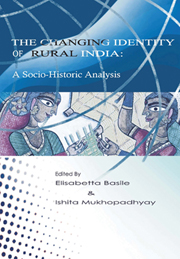Book contents
- Frontmatter
- Contents
- Acronyms and Abbreviations
- About the Authors
- INTRODUCTION
- PART 1 INDIAN RURAL TRANSFORMATIONS
- Identifying Livelihoods in Rural India
- The Institutional Embeddedness of Indian Rural Capitalism
- PART 2 INEQUALITY IN RURAL INDIA
- PART 3 SOCIAL MOVEMENTS AND IDENTITIES
- Appendix 1 Socio-Economic Indicators of Rural India
Identifying Livelihoods in Rural India
from PART 1 - INDIAN RURAL TRANSFORMATIONS
Published online by Cambridge University Press: 05 March 2012
- Frontmatter
- Contents
- Acronyms and Abbreviations
- About the Authors
- INTRODUCTION
- PART 1 INDIAN RURAL TRANSFORMATIONS
- Identifying Livelihoods in Rural India
- The Institutional Embeddedness of Indian Rural Capitalism
- PART 2 INEQUALITY IN RURAL INDIA
- PART 3 SOCIAL MOVEMENTS AND IDENTITIES
- Appendix 1 Socio-Economic Indicators of Rural India
Summary
The question of livelihoods in both rural and urban India has reached complexity in contemporary times when the country has taken recourse to neo-liberal policies. Livelihoods have been diverse and labour markets have been segregated. While the advent of neo-liberalism in the country meant unemployment, poverty and inequality to a large section of the population, simultaneously this has also meant creation of a new kind of job market with more flexible labour. This complexity in the labour market together with agrarian change implied changing pattern in livelihood creation in rural India. Since rural India meant more than an agrarian economy, it became crucial to study the changing pattern of rural livelihoods in the post-liberalization period in India. The paper is an attempt to explore the pattern of employment changes experienced in rural India through creation and adoption of new livelihoods by the rural population. The paper starts with a review of the question of rural livelihoods and the question of rural change in India as depicted by researchers in Section 1. It then discusses the changing pattern of rural employment in India as experienced in the last decade in section 2 followed by a conclusive section 3.
RURAL LIVELIHOODS IN THE MAKING
The question of changing rural livelihoods under the forces of neoliberalism and globalization arises due to complexity in the form of flexibilization of labour force and multiplicity of occupations. This was pointed out by Deshpande, Standing and Deshpande (1998), Ellis (1998), Carney (1998) and Scoones (1998).
- Type
- Chapter
- Information
- The Changing Identity of Rural IndiaA Sociohistoric Analysis, pp. 15 - 30Publisher: Anthem PressPrint publication year: 2009



